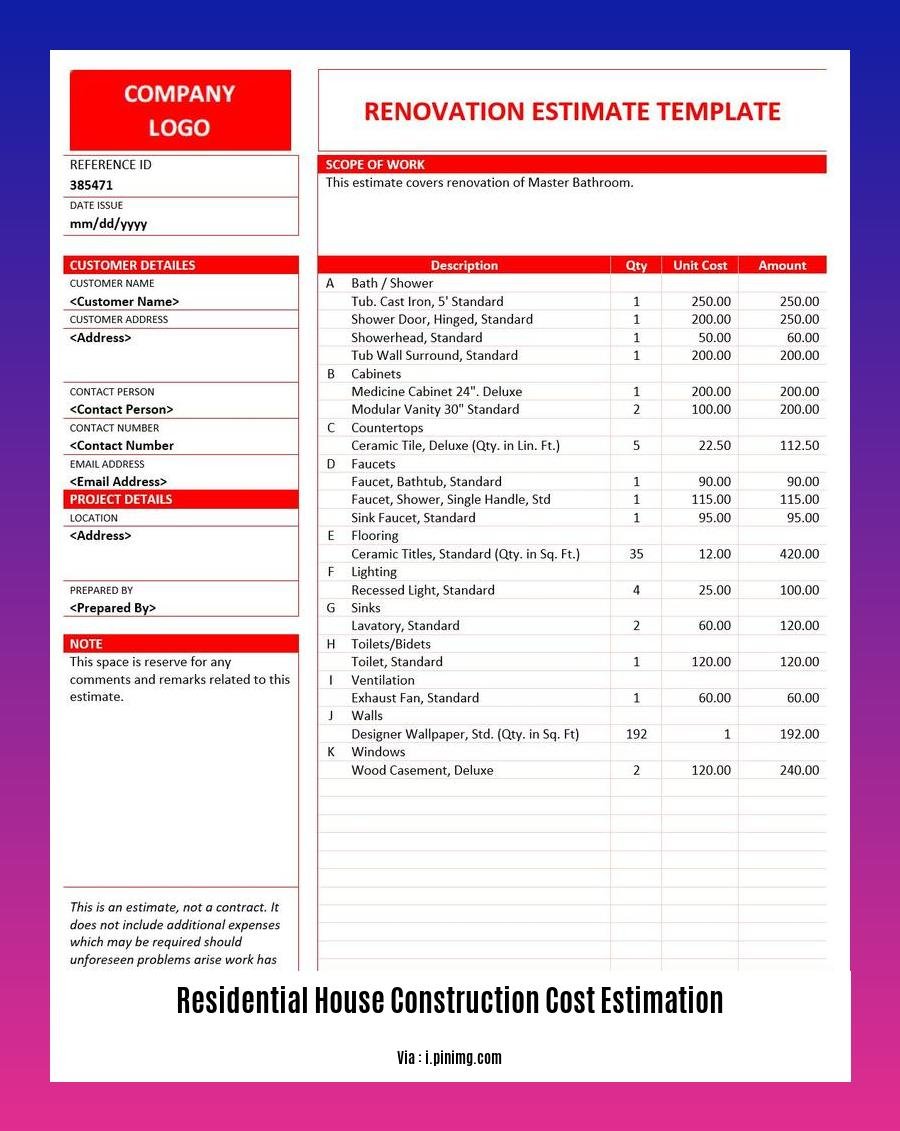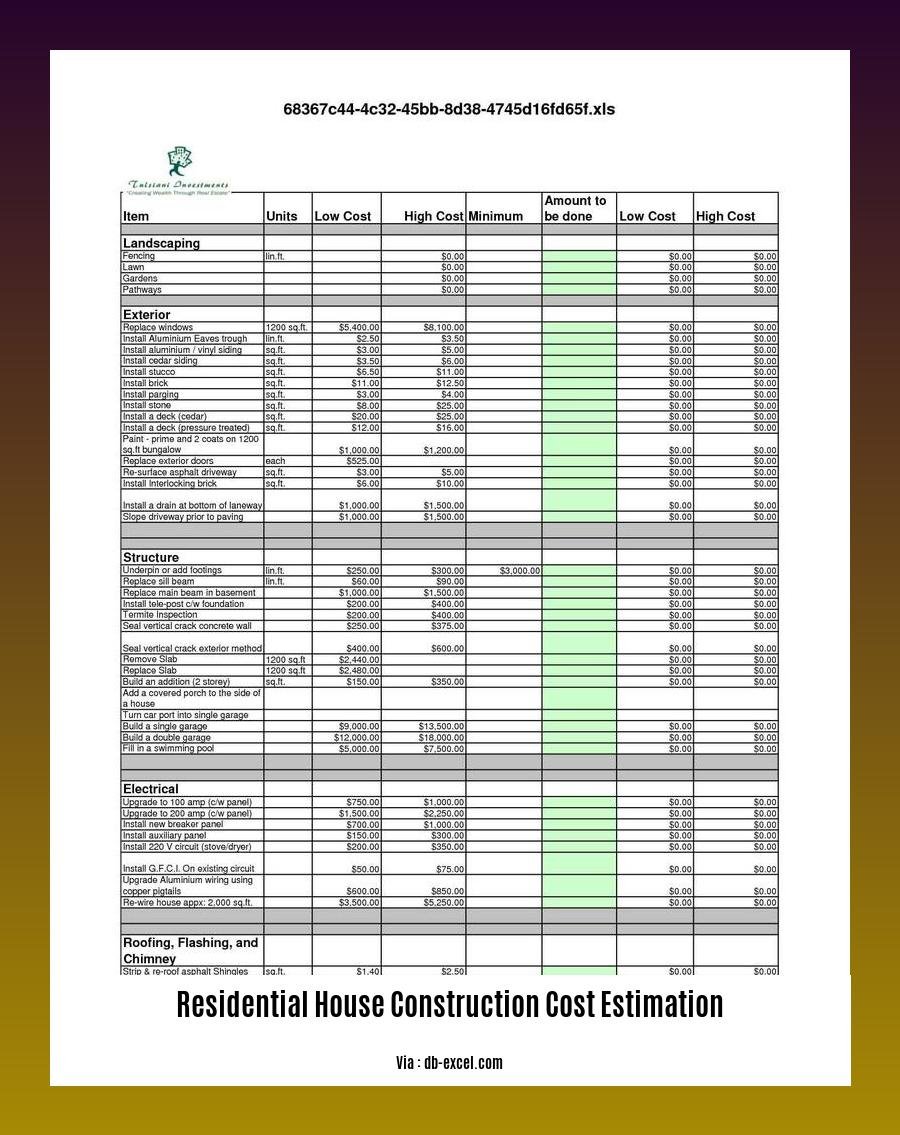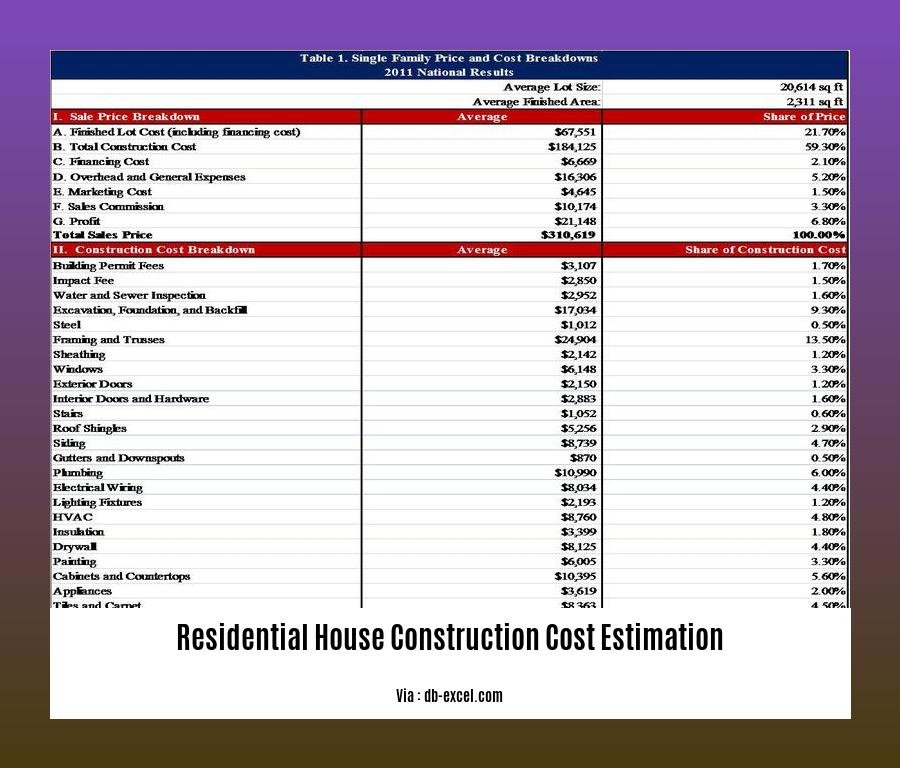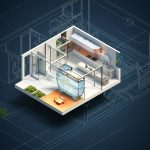Are you planning to build your dream home or invest in residential construction projects? Understanding residential house construction costs is essential for informed decision-making. This comprehensive guide, [Residential House Construction Cost: A Comprehensive Guide], will provide you with the insights and knowledge you need to navigate the complexities of residential construction cost estimation. We’ll delve into material expenses, labor rates, construction techniques, cost estimation software, building codes, and regulations, empowering you to make informed choices and ensure your projects are executed within budget and to the highest standards.
Key Takeaways:
- Average US house construction cost: $296,351
- Typical construction cost range: $111,260 to $481,443
- Cost per square foot for new homes: $100 to $155
- Homeowners’ cost range for new homes: $155,000 to $416,250
- Average construction cost excluding land: $300,000
Residential House Construction Cost Estimation

Understanding residential house construction cost estimation equips you with vital information for making informed decisions. Let’s guide you through the key factors influencing these estimations:
Factors Influencing Construction Costs:
- Location, terrain, and labor availability
- Size, design, and complexity of the house
- Materials used, including their availability and quality
- Construction methods and techniques employed
- Permits, fees, and insurance requirements
Average Costs:
On average, building a house in the US costs around $296,351, ranging from $111,260 to $481,443. The cost per square foot typically falls between $100 to $155, translating to $155,000 to $416,250 excluding land.
DIY vs. Hiring a Contractor:
While DIY projects can save you money, they require significant time, effort, and expertise. Professional contractors streamline the process, ensuring adherence to building codes and minimizing delays.
Steps for Cost Estimation:
- Gather construction plans and specifications
- Research material costs and labor rates
- Estimate time and resources required
- Add contingencies for unexpected expenses and delays
Tips for Accuracy:
- Obtain multiple bids from contractors
- Consider inflation and market fluctuations
- Factor in soft costs like permits and inspections
- Consult with an architect or engineer for complex designs
Conclusion:
Residential house construction cost estimation empowers you to plan and budget effectively. By considering the factors above and following the recommended steps, you can make informed decisions and ensure a smooth construction process. Remember, accuracy is crucial, so don’t hesitate to seek professional advice when needed.
Concerned about the rising residential home construction cost estimator? You can now estimate your construction cost easily. Wondering how to reduce construction cost? Here’re some mind-blowing tips. Know everything about rcc construction cost here. Want to know about rcc construction cost per sq ft in mumbai? We have got you covered, click now. In need of puf panel house construction cost details? Explore various cost-effective options now.
Construction Methods and Techniques

In residential house construction, countless construction methods and techniques are employed to achieve structural integrity, energy efficiency, and aesthetic appeal. From traditional framing to advanced modular building, each approach has its advantages and disadvantages.
Key Takeaways:
- Method selection is influenced by factors like project complexity, budget, and site conditions.
- Traditional framing constructs a wooden frame and sheathing the structure.
- Concrete block provides durability and fire resistance, but may require additional insulation.
- Steel framing is lightweight and strong, but susceptible to rust and requires skilled labor.
- Modular building involves prefabricating building components off-site and assembling them on-site.
Choosing the appropriate construction method is crucial for successful project outcomes. By considering the project’s unique requirements and leveraging the right techniques, you can ensure a safe, sustainable, and cost-effective residential house.
Sources:
- Construction Methods in House Building
- Construction Techniques for Modern Homes
Estimation Software and Building Codes
When it comes to residential house construction, having accurate cost estimates can make or break your project’s budget. That’s where estimation software comes in handy. These tools can help you crunch the numbers and ensure that your project stays on track financially.
Building codes are another crucial aspect of construction estimation. These regulations dictate everything from the materials you can use to the way your house is built. By understanding building codes, you can avoid costly delays and ensure that your project meets the required safety and quality standards.
How to Choose Estimation Software
Choosing the right estimation software for your project is essential. Here are a few factors to consider:
- The size and complexity of your project
- Your budget
- Your level of expertise in construction estimation
- The compatibility of the software with your other software programs
Benefits of Using Estimation Software
- Improved accuracy: Estimation software uses algorithms and data to generate more accurate estimates than manual methods.
- Time savings: These tools can automate many tasks, freeing you up to focus on other aspects of your project.
- Increased efficiency: Estimation software can help you streamline your workflow and improve communication with clients and contractors.
Key Takeaways:
- Estimation software can help you generate accurate cost estimates for your residential house construction project.
- Building codes are essential for ensuring that your project meets safety and quality standards.
- When choosing estimation software, consider factors such as project size, budget, and expertise.
Sources:
- Archdesk: Best Construction Software Tools
- Capterra: Residential Construction Software
Factors Influencing Cost Variations
Considering construction projects? Stay informed about factors affecting cost variations and avoid unexpected expenses.
Key Takeaways:
- Complexity and timing of variations impact costs significantly.
- Material availability, communication, and coordination play crucial roles.
- Different types of variations (minor vs. major) have varying cost implications.
- Legal implications and best practices are important to manage variations effectively.
Understanding Variation Costs
Variations during construction projects are alterations to the original plan. These changes, whether minor or major, often lead to cost variations. Several factors influence these costs:
Complexity of Variations
Changes involving structural modifications or specialized materials can significantly increase expenses.
Timing of Variations
Early variations allow for better planning and resource allocation, reducing costs compared to late changes.
Material Availability and Resources
Shortages or delays in material availability can cause price increases and extended timelines.
Communication and Coordination
Clear communication and teamwork between the builder and homeowner minimize costly misunderstandings.
Types of Variations
Variations range from minor adjustments to complete redesigns. Minor variations, such as paint color changes, have minimal cost implications. Major variations, like altering the floor plan, can significantly impact costs.
Legal Implications and Best Practices
Variations can trigger legal disputes if not managed properly. Establish clear responsibilities, obtain approvals, and document changes to avoid issues.
Legal Implications and Best Practices**
- Establish clear contracts that outline procedures for variations.
- Maintain open communication and involve all stakeholders in decision-making.
- Document all variations and changes for transparency and accountability.
Sources:
FAQ
Q1: How much does it typically cost to build a house in the US?
Q2: What factors can influence the cost of building a house?
Q3: How can I estimate the cost of building a house?
Q4: What are the different construction cost estimation methods?
Q5: What should I consider when choosing a construction estimating software?
- Gray And White Backsplash: Ideas For Timeless Style - December 12, 2025
- Gray Kitchen Backsplash Ideas: Find Your Perfect Gray Tile - December 11, 2025
- Glass Wall Tiles For Bathroom: A Stylish, Durable Choice - December 10, 2025









